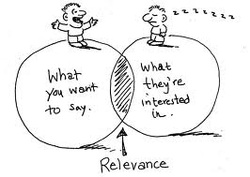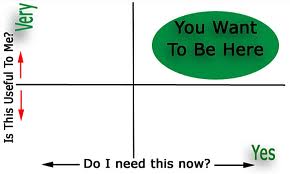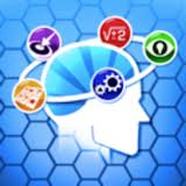
Something that is relevant has a connection to the subject matter; is pertinent; and applicable. It also must be something that interests and challenges us. Relevance makes rigor bearable and learning meaningful. If something is relevant, I get it. My interest is piqued; I am interested, and therefore I care enough to learn it well or find out more. Those "aha" moments we have are sometimes as a result of inspiration, but many times occur because a connection has been made and the material we once thought was difficult, suddenly makes sense, becomes relevant, and leads us to understanding... even Geometry!
We need to know and be able to do "stuff," but more importantly we have to know how and when to use all that "stuff" we know and can do. Otherwise, it all becomes useless trivia, or memorized information that eventually slips into the abyss of our minds. It is often said by many, including me, "if you don't use it you'll lose it." I find that to be true about the things I've learned and filed away in my brain as well as the physical skills that I once possessed. I wonder how much I failed to learn along the way because I didn't find that meaningful connection that allowed me to USE that information, and therefore save it for future use?
This begs the question, "How do I make what I need to learn relevant so that I will be more apt to learn it well and use it again?" I cannot rely solely on others to make that happen for me. I have to be able to find connections for myself and be responsible for my own learning. As educators and parents, we have to teach our kids how to make those connections and not just blow off a particular topic or subject as "boring" or "too hard" or because we perceive it as irrelevant!
Think about the people who don't care about a particular issue until it affects them personally. Now that issue has become relevant because they care about how it impacts their life or the lives of their family or friends. Relevance requires some emotional attachment to the learning, issue or situation. We have to feel its importance and find a way to connect it to our own way of thinking and doing. The kind and quality of the relationship you have with the person who is teaching you or the people you are working with affects the degree of relevance, and thus, the need to understand or to act.
Relevance requires an answer to the "why and when" questions we have. Why do we have to learn this? Why is this important? When will I use this information or skill? Consider how recognizing this need would improve the kind of directions we give and ultimately the quality of the results? This concept relates to the business model of "Why, How, and What," by Simon Sinek that I discussed in a previous blog. If we address the "why" before telling people what to do and how to do it, then we immediately increase the relevance because we have answered one of the big questions that helps us prioritize our need to know. This applies to teachers, parents, bosses, and just dealing with the general public.
History is an example of a subject that some people love and others loathe. "Why do I have to know this" is a frequent lament of students. There are many reasons to know and understand what happened in the past so that you can plan for the future. But knowing that intellectually is much different than personally feeling the connection to "the need to know." CBS recently went "On the Road" to North Carolina and found a 5th grade teacher that inspired his students to learn history by re- enacting a battle from the Civil War as a class project. The research required to produce the culminating activity (re-enactment) helped this significant piece of history become relevant to students who live in today's high tech world. (To watch this short video, click here.) I would encourage you to listen to and watch the details that have been learned. Feel the emotion and empathy these children have experienced. Rigor and relationships played a large role in making this learning experience relevant, and therefore, meaningful.
We all learn differently, have different interests, strengths and weaknesses. So as educators, it is up to each of us to help students learn how to find relevance in what they study. Parents face the same challenges. Taking the time to get to know someone (relationships) improves the chances we will understand those individual preferences so we can help students find meaning in the challenges (rigor) of their learning experiences. I know for myself, that relevance is a motivator that gets me going and keeps me interested. This is especially important if the task is not something I really enjoy.
Relevance also requires us to stay fresh and be willing to change and grow. What are you doing to be relevant? To teach in a relevant way? To encourage relevance in your own kids or students? What is relevant today may be irrelevant tomorrow. Once upon a time I kept a diary. Now I blog or journal on my computer. Once I was proud to have typed 50 words per minute on a manual typewriter. Now you find them in museums and antique stores. Finding relevance requires effort. Staying relevant requires reflection and revision.
Finding relevance is an intentional behavior and is most often present when there is sufficient challenge to interest me, and the necessary relationships to support me. Only then will this new learning be beneficial to me in another situation down the road and not just saved for a trivia contest. Even Geometry can become meaningful.


 RSS Feed
RSS Feed